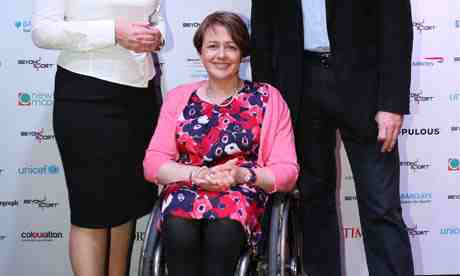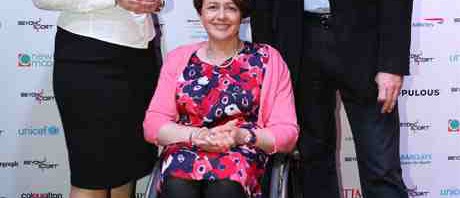
Tanni Grey-Thompson has warned that disability benefits cuts will damage athletes' development. Photograph: Lee Mills/Action Images
Disabled campaigners are planning a week of action during the Paralympic Games at the end of August to protest at the way people claiming sickness and disability benefit are treated.
The private company Atos Healthcare, one of the Olympics’ sponsors, has come under fire for its handling of a £100m-a-year contract with the Department of Work and Pensions (DWP) to assess whether people claiming for sickness and disability benefits are fit for work.
The Paralympic protests have been organised by the campaign group Disabled People Against the Cuts [Dpac]. Activists are planning to target Atos centres in their local areas before converging on 31 August in London, where they will join with campaigners from UK Uncut to take part in what is described as a “daring and disruptive action”.
Paddy Murphy, from Dpac, said: “We’re not against the Paralympics or the athletes, but it is completely inappropriate that Atos are sponsoring the Games. Implementing the government’s welfare reform agenda, Atos have devastated the lives of hundreds of thousands of disabled people and made millions of pounds of profit doing it. Now they are trying to portray themselves as supporters of disabled athletes. It’s offensive.”
Murphy said it was a golden opportunity for disabled people to show they would not be intimidated. “We are challenging them [Atos and the assessments] in the courts, in parliament, online, on the streets and now at the Paralympics. The work capability assessment must end now,” he said.
Atos Healthcare tests around 11,000 incapacity benefit claimants a week, using the work capability assessment. MPs have criticised the company for a “flawed” approach that they say has left thousands of disabled people wrongly denied benefits, and which has become a lightning rod for criticism of the government’s welfare reforms.
Britain’s most famous Paralympian, Tanni Grey-Thompson, has warned that disability benefit cuts will affect the development of top athletes and undermine the Games’s key legacy aim of widening access to sport for disabled people. She said changes to disability living allowance (DLA) would take vital day-to-day financial support away from many disabled people, including athletes.
Last summer, the Commons work and pensions select committee said the very mention of Atos Healthcare triggered “fear and loathing” among claimants, and concluded that there had been failings in the service provided by the company, which had “often fallen short of what claimants can rightly expect”.
A secret film showing the training given to doctors recruited by Atos to assess whether sickness and disability benefit applicants are fit for work suggests staff are monitored to ensure they do not find excessive numbers of claimants eligible.
Disability charities, meanwhile, have been critical of the company’s record. Some terminally-ill cancer patients have been told they are fit for work, while other claimants have died from their conditions shortly after being found fit for work.
In a statement, a spokeswoman for Atos said it supported people’s right to protest, adding it was “very aware that work capability assessments can be stressful for those involved, and this is why we strive to make sure the assessment service that we provide is as highly professional and compassionate as it can be. We do this through a constant programme of training and education for our staff.
“A rigorous recruitment process for healthcare professionals, and through continual work with the government, disability rights groups, healthcare professionals and those going through the process on the ground.”
Earlier this year Paralympic organisers defended Atos’s sponsorship of the Games. Craig Spence, communications director for the International Paralympic Committee, dismissed fears that the company’s sponsorship deal, on which Atos is spending an estimated £64m over 10 years, could lead to protests and boycotts.
“I think the majority of people watching will be marvelling at the fantastic performances of our elite athletes as opposed to a small minority who will be protesting,” he said.
A spokesman for the DWP said: “It’s disappointing that a small number of organisations are protesting against their [Atos’s] sponsorship of the Paralympic Games, especially given the improvements which have been made to the work capability assessment in the past two years.”
Disability campaigners have played an increasingly prominent and radical role in direct-action protests over the past 12 months, closing major junctions in central London by chaining themselves to traffic lights and helping block off Nick Clegg’s street for an anti-cuts demonstration earlier this year.
Kat Templeton, from UK Uncut, said: “Disabled campaigners have been leading the fight against the government’s assault on our vital public services and welfare state. It’s really important that everybody concerned with the cuts and austerity acts with them.”
guardian.co.uk © Guardian News & Media Limited 2010
Published via the Guardian News Feed plugin for WordPress.


3 Responses
There is no GB paralympics team as according to atos these people are fit for work and are not disabled so are not entitled to enter into said games (thought games were for kids)
“I think the majority of people watching will be marvelling at the fantastic performances of our elite athletes as opposed to a small minority who will be protesting,” Typical thatcher attitude tory scum
its with crying shame of it all with our elite mps who run us ,after the games atos will quietly go about calling in all those athletes who have been claiming dla and they find out whots it like to be atos and while they were told whot would happen as our mps havent any use for them afterwards ,so they taken the poisend penny off atos into the olimpic only for it to do their athelets down by taking dla away leff3